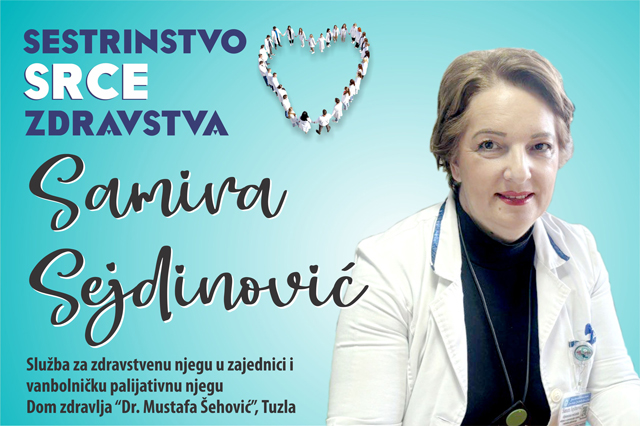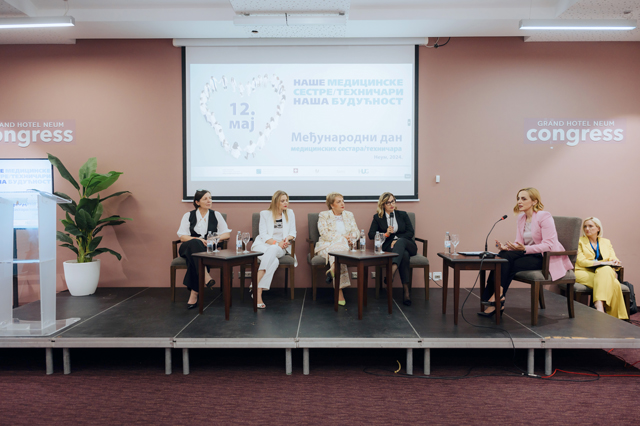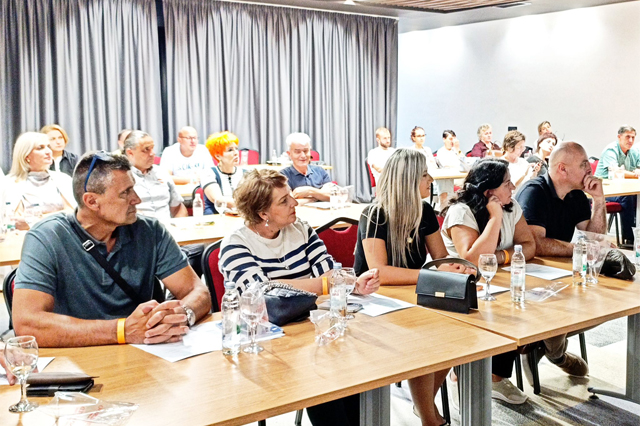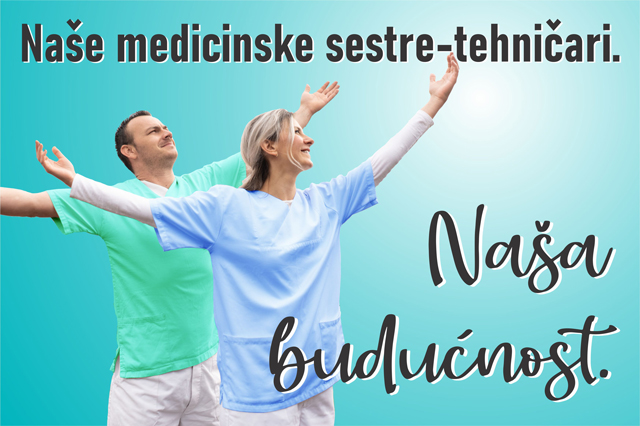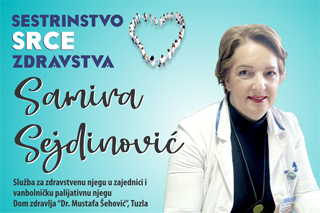
Samira Sejdinovic is a nurse working at “Dr. Mustafa Sehovic” Primary Health Care Center in Tuzla, at the Community Nursing and Palliative Home Care Service. She is the author of several new procedures that contribute to improving care quality and increasing patient safety.
When did you start your professional career and what motivated you to dedicate yourself to nursing? My first work experience dates back to 1995 at the Primary Health Care Center Banovici. After several on and offs and working in other businesses, I started working at the Primary Health Care Center Tuzla in 2009. I knew that nursing was a dynamic profession, offering opportunity for continuous improvement, combining knowledge, humanity and empathy, and that it brings along personal satisfaction. Today, as an adult who chose this profession more than 35 years ago, I can say that I am proud of my choice, because being a nurse means having a big heart and the courage to always be there for those in need.
What is your current job and what are your responsibilities? I currently work at the Department of Community Nursing and Palliative Care as Community Nurse. My responsibilities include a wide range of tasks focusing on health promotion and disease prevention of individuals, families and community - especially through prevention, education and care in patients’ homes.
What does one of your working days look like? My working day is very diverse as it involves working with different generations – from newborns to the elderly and patients with different health conditions. Every day begins with a morning meeting and planning of the activities and home visits, followed by preparation of materials and equipment for home visits. After the home visits, I return to our department, make a record of all the visits and process other relevant documentation. At the end of the day, colleagues and I make a short meeting to agree on the following day activities.
How is the position of nurses in Bosnia and Herzegovina nowadays in your opinion? Being a nurse in Bosnia and Herzegovina nowadays means taking on a complex and demanding role that carries great responsibility, but also brings professional satisfaction. Lately, the importance of education and professional development of nurses is being progressively recognized; they have the right and obligation to plan, organize, implement and evaluate nursing care, to be equal members of the healthcare team and to continuously advance. On the other hand, the reality is not that simple – lack of staff, many patients, especially the elderly, chronic stress and insufficient financial compensation compared to the work volume represent significant challenges. Despite everything, nurses remain a pillar of the healthcare system, dedicated to providing quality care and protecting the dignity of each patient.
What are the most common challenges you face in your daily work? There are numerous challenges – both professional and personal. These include a large number of patients compared to the number of nurses, difficult access to certain areas, lack of technical support, as well as the emotional stress that work with seriously ill patients brings along. There are also conflicts with patients or families, and the constant need for training and learning of new nursing care models. All of this requires enormous professionalism, empathy and inner strength.
How do you contribute to improving the quality of nursing care? I provide continuous nursing care to patients in their homes, with a special focus on chronically ill patients, pregnant women and woman in postpartum period. I am the author of several new procedures that contribute to improving the quality of care and increasing patient safety. I actively participate in the education of new generations of nurses through the Strengthening Nursing in BiH project, transferring knowledge and experience in practice. I also participate in specialist education in the field of neonatal care, breastfeeding promotion and chronic wound treatment. My greatest success is not individual recognition, but a visible contribution to the health and well-being of the people I provide service to. This year I plan to enroll in a master's degree in order to further expand my knowledge and competencies.
What would you like to be improved at the institution where you work at? I think that each of us in the healthcare system would give a similar answer: modern medical equipment, availability of materials, more health professionals, regular trainings and seminars, and digitalization that would reduce paperwork and facilitate the work of health professionals.
How important is the relationship between a nurse, patient and doctor? The relationship between a nurse and a patient, in cooperation with a doctor, is a key element of quality nursing care. This relationship must be based on trust, open communication and clearly defined roles. With a quality exchange of information and mutual respect, cooperation between a nurse and a doctor contributes to greater patient safety and a more beneficial treatment process.
What motivates and fulfills you the most in your work? My job is diverse and dynamic, and the motivation is multifaceted –patients’ benefit, their satisfaction and gratitude, as well as my personal professional development. Nursing is a profession that contributes to the health of the entire society, not just an individual. Exactly the fact that my work has meaning and purpose gives me the strength to continue with the same enthusiasm every day.
To what extent has Strengthening Nursing in BiH project influenced your professional development? The significance of Strengthening Nursing in BiH project implemented by the Fami Foundation is enormous for me. I have been involved in it since 2016 and it gave me opportunity to participate in numerous trainings in the field of communication in health, management and leadership. The project has contributed to strengthening my professional identity and strengthening community nursing practice with the support of the relevant ministries and the Embassy of Switzerland. I believe that projects like this contribute to the development of a stronger and more efficient healthcare system in BiH.
What message would you convey to young people who are considering a nursing career? Future nurses should know that this is a profession that requires knowledge, patience and true compassion. The reward for that effort is priceless – the feeling that job you are doing contributes to a better and quality life of people. If you like to help, learn and be with people, nursing is not just a profession, but a way of life.
